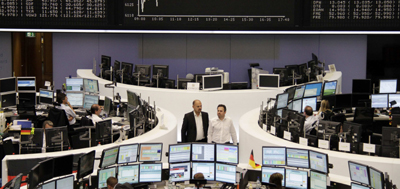Thursday, 26 March 2015 20:29
 PARIS: European stocks fell for a second straight session on Thursday, hurt by worries over valuation levels in growth sectors such as technology as the euro currency regained more ground.
PARIS: European stocks fell for a second straight session on Thursday, hurt by worries over valuation levels in growth sectors such as technology as the euro currency regained more ground.
Shares in Nokia Alcatel-Lucent, STMicroelectronics, ARM, and ASML were down 3.4 percent to 4.2 percent, mirroring a similar decline in U.S. tech shares on Wednesday.
Shares in European tech firms – seen as benefitting significantly from the drop in the euro currency over the past year – had surged 42 percent since mid-October, outpacing the overall market and sending the sector to valuation ratios well above long-term averages.
The sector trades at 20.4 times expected earnings in the next 12 months, above a 10-year average of 16.2 times, while the broad STOXX Europe 600 index currently trades at 16 times expected earnings, according to Thomson Reuters Datastream.
“With the euro bouncing back and with stock indexes near seven-year highs, investors are starting to think that a lot of positive news is already reflected in lofty valuation levels and that it’s time to book some profits,” Barclays France director Franklin Pichard said.
“The rebound in the euro could become the big catalyst for a pullback in European stocks.”
At 1210 GMT, the FTSEurofirst 300 index of top European shares was down 1.5 percent at 1,563.91 points.
Shares in London Stock Exchange tumbled 8.7 percent after Borse Dubai, its biggest shareholder, sold its complete 17.4 percent stake in the UK market operator.
European shares have rallied in the past six months as investors bet a sharp drop in the euro currency would boost the region’s economy and lift corporate results.
The euro reached 1.1051 on Thursday, pulling further away from a 12-year trough of $ 1.0457 hit last week and prompting investors to start cashing in profits.
However, the currency is still down about 20 percent over the past year, which is set to give euro zone companies a major lift as roughly 50 percent of euro zone earnings come from outside the region.
“For the euro zone, which is the biggest exporting region in the world, such a drop in its currency is extremely positive, and the market has not yet fully priced this in,” said Alain Bokobza, head of strategy, global asset allocation at Societe Generale.
The euro’s slide was driven by prospects of a quantitative easing programme from the European Central Bank, which was launched this month, contrasting with the trajectory of monetary policy in the United States where the Federal Reserve is seen raising interest rates in 2015.
Energy stocks bucked the market on Thursday as Brent crude oil soared more than 4 percent towards $ 59 a barrel after Saudi Arabia and its Gulf Arab allies began a military operation in Yemen, which sits on a key shipping passage between Europe and the Arab Gulf.
Copyright Reuters, 2015



























